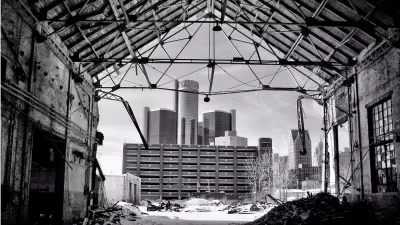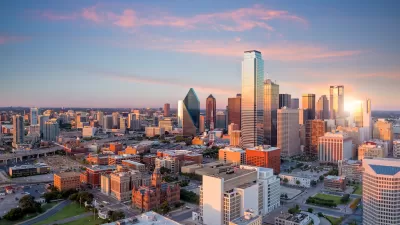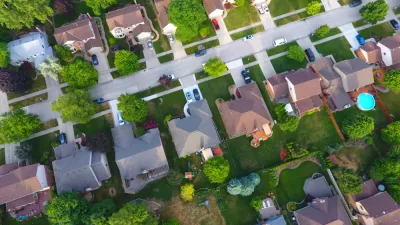Quicken Loans founder Dan Gilbert has an urbanist streak. And only people with his kind of money can singlehandedly buy out big chunks of downtown Detroit. But will his approach to neighborhood-making actually benefit the city as a whole?

In recent years, billionaire Dan Gilbert has been busy buying much of downtown Detroit south of Adams Street. Unlike urban speculators before him, Gilbert doesn’t raze and rebuild or sit on parking lots. He intends to revitalize the neighborhood as it stands, fixing up classic old derelicts and re-purposing them to befit a tech-savvy modern economy.
For that, “people in Detroit talk about Gilbert like he’s the Wizard of Oz, and that might be the closest analogy. He may be a land-hungry billionaire — but he’s the most civic-minded land-hungry billionaire the city has seen in a long time.”
But the picture isn’t all rosy. The article explains how Zappos founder Tony Hsieh attempted to create a walkable business haven in downtown Las Vegas, with disappointing results. An actual visit to Gilbert’s new district is underwhelming. There’s a lack of diversity, and few actual customers to patronize the hip retailers Gilbert attracts. The district seems disconnected from the rest of Detroit.
The article questions whether it is wise to rely on the resources and whims of the super-rich to turn urban cores around. Developers like Dan Gilbert may come armed with dollars and a vision, and even good intentions, but their methods for urban "placemaking" are always dictated from the top down.
FULL STORY: Behind every crumbling downtown is a billionaire who wants to save it

Manufactured Crisis: Losing the Nation’s Largest Source of Unsubsidized Affordable Housing
Manufactured housing communities have long been an affordable housing option for millions of people living in the U.S., but that affordability is disappearing rapidly. How did we get here?

Americans May Be Stuck — But Why?
Americans are moving a lot less than they once did, and that is a problem. While Yoni Applebaum, in his highly-publicized article Stuck, gets the reasons badly wrong, it's still important to ask: why are we moving so much less than before?

Using Old Oil and Gas Wells for Green Energy Storage
Penn State researchers have found that repurposing abandoned oil and gas wells for geothermal-assisted compressed-air energy storage can boost efficiency, reduce environmental risks, and support clean energy and job transitions.

Greening Oakland’s School Grounds
With help from community partners like the Trust for Public Land, Oakland Unified School District is turning barren, asphalt-covered schoolyards into vibrant, green spaces that support outdoor learning, play, and student well-being.

California Governor Suspends CEQA Reviews for Utilities in Fire Areas
Utility restoration efforts in areas affected by the January wildfires in Los Angeles will be exempt from environmental regulations to speed up the rebuilding of essential infrastructure.

Native American Communities Prepare to Lead on Environmental Stewardship
In the face of federal threats to public lands and conservation efforts, indigenous groups continue to model nature-centered conservation efforts.
Urban Design for Planners 1: Software Tools
This six-course series explores essential urban design concepts using open source software and equips planners with the tools they need to participate fully in the urban design process.
Planning for Universal Design
Learn the tools for implementing Universal Design in planning regulations.
Heyer Gruel & Associates PA
City of Moreno Valley
Institute for Housing and Urban Development Studies (IHS)
City of Grandview
Harvard GSD Executive Education
Salt Lake City
NYU Wagner Graduate School of Public Service
City of Cambridge, Maryland




























